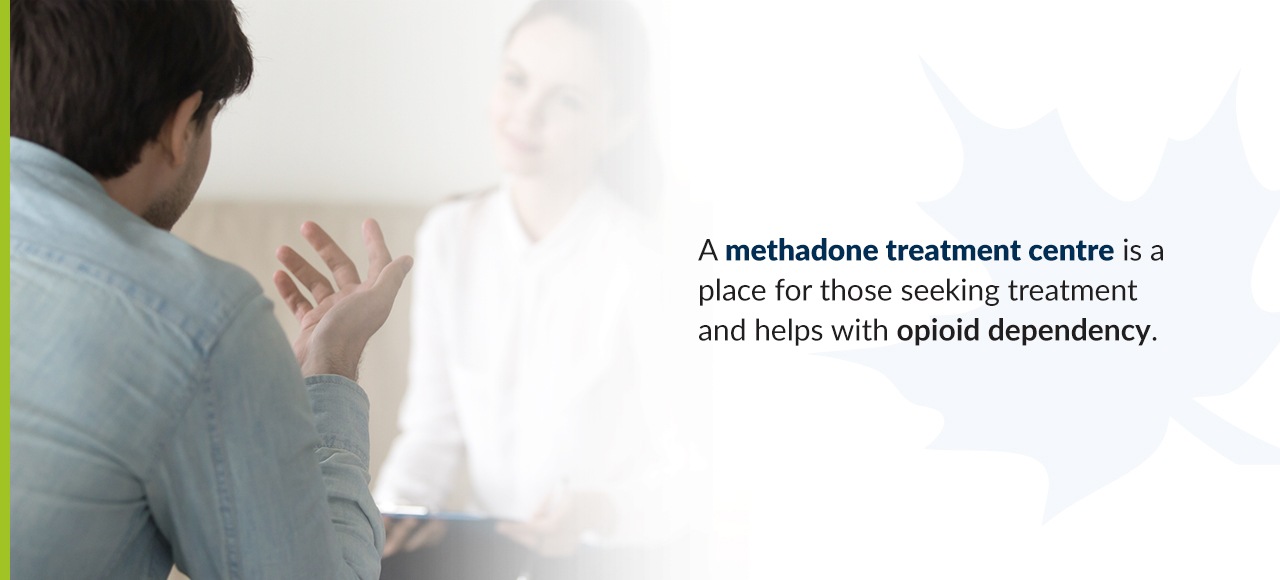Understanding What Methadone Is and How It Works
Understanding What Methadone Is and How It Works

As a class of drugs, opioids include hydrocodone, oxycodone, fentanyl, heroin and morphine. All opioids are chemically similar, interacting with the nerve cells’ opioid receptors throughout the body and brain. Generally, opioid pain relievers can be safe when taken for an appropriate amount of time with a doctor’s prescription and supervision, but they can lead to a dependency if misused.
Opioid Use in Canada
The opioid crisis in Canada has significantly impacted the lives of individuals, families and whole communities. Research has shown that Canadians between the ages of 15 and 24 are the fastest-growing population that needs hospital care due to an opioid overdose. As the opioid crisis continues to grow, accidental overdoses also increase. Approximately 94% of opioid overdose deaths happen by accident, signaling just how dangerous opioid use is.
Opioids can be extremely dangerous and lead to problematic use because they produce a sensation of euphoria and happiness. While opioids are prescribed to help manage severe or chronic pain, they are often misused. Some people may become dependent on opioids and use them longer than needed. On the other hand, some people may seek out opioids without a prescription.
What Is Methadone?
Methadone is an opioid drug commonly used to help treat clients who have developed a dependence to oxycodone, fentanyl, heroin or other opioids. For treatment, a client will take a daily dose of methadone, typically in liquid form, reducing uncomfortable or dangerous withdrawal symptoms and desires to use opioids.
While methadone is an opioid drug, it is much safer to take methadone under medical supervision than continuing dependency on another opioid. Additionally, opioids such as heroin are injected, leading to HIV or hepatitis C transmission if needles are unsanitary or shared. Methadone is even included in the World Health Organization’s list of essential medicines, signaling its importance and utility in treating opioid dependency.
How Does Methadone Work?
Many medical professionals use methadone to treat addiction to various opioid drugs. Methadone is an effective opioid addiction treatment that is often prescribed for long-term treatment. The overall length of methadone treatment may vary from one or two years up to 20 years or more. At the end of methadone treatment, the overall dose is tapered down over weeks or months to ease the withdrawal process and end treatment.
Methadone may be used to treat someone with a dependency on fentanyl, hydromorphone, heroin or oxycodone. On average, the effects of methadone typically last for 24 to 36 hours. When taken appropriately, methadone can help prevent uncomfortable withdrawal symptoms and reduce the urge to use another opioid.
What Are the Side Effects of Methadone?
While methadone is an effective treatment, it may cause several side effects, including:
- Excessive sweating
- Dry mouth
- Low libido
- Constipation
- Light-headedness
- Nausea
- Drowsiness
- Vomiting
- Weight Gain
Is Methadone Addictive?
Did you know that one of the most common concerns with methadone treatment is the potential for addiction? It is essential to understand that methadone is a type of opiate, which means that it inherently carries the risk of abuse and addiction. This is why a reputable center must administer the treatment.
Since methadone is considered longer-acting, it is also described as a less potent variety of opiate. This means that it will not be able to generate an intense effect like heroin and other similar addictive opiates. This translates to slow-onset of highs including tolerable lows. However, abuse of methadone can still happen when the doses taken are higher than what is prescribed for the maintenance schedule. The person can experience potentially dangerous and heightened effects.
Increasing the doses without medical consultation can also result in intense withdrawal symptoms that can put rehabilitation efforts at risk. This would be unfortunate since methadone is an extremely valuable pharmaceutical treatment for addiction. This is especially true when it is taken as prescribed and with the proper supervision. Eventually, unpleasant withdrawal symptoms and risky side effects will be minimized.
Does Methadone Appear in Drug Tests?
If your concern is turning positive on drug tests, then you will be happy to know that methadone does not return a positive, unlike heroin or morphine. Specific testing for methadone should be done to be able to detect its presence in your system.
How Successful Is Methadone in Canada?
Methadone maintenance treatment is an effective program for clients recovering from an opioid dependency. Fortunately, many clients with an opioid dependency experience success with methadone treatment and are at a lower risk of using and experience fewer drug-related risks, including HIV transmission from needle sharing.
Methadone can help clients stay on track and continue their detoxification treatment. Methadone is also an effective treatment to help reduce relapse for those dealing with a heroin dependency. Research indicates clients experience significant positive changes in self-reported emotional and behavioral function during a methadone maintenance treatment.
What Is a Methadone Treatment Centre?
A methadone treatment centre is a place for those seeking treatment and helps with opioid dependency. A clinic can administer methadone as replacement therapy to help a client with an opioid dependence discontinue the use of potentially more dangerous and illegal opioids. Methadone can help manage withdrawal symptoms and curb cravings that clients may experience with an opioid dependency.
How Does a Methadone Program in Canada Work?
A methadone program is an effective treatment modality and rehabilitation tool. Methadone has a long half life formula that makes it stay active in the body longer. When methadone is in the body, it blocks the euphoric effects that other opioids may have on the brain. Methadone also manages uncomfortable and dangerous withdrawal symptoms so clients can focus on their recovery process.
When a client first enters a methadone program, they will be screened and evaluated by the clinical staff. Understanding a client’s personal history and previous drug use can help a clinical staff determine the best treatment regimen. In some cases, a clinic may need to monitor a client’s intake more closely if they have an increased risk for potential dependency. Clients with certain medical conditions may not be ideal candidates for methadone treatment, so careful screening is necessary.
Learn More About Methadone Treatment
Who Is Methadone Prescribed To?
Methadone treatment is prescribed to clients with opioid dependency. Treatment is prescribed by a physician. There is a prevailing policy for how methadone maintenance treatment should be implemented for clients within a program in Canada. If methadone is used, it should be done so with opioid dependence treatment. Additionally, each province is responsible for its respective guidelines for methadone treatments.
How Is Methadone Prescribed?
Before entering a methadone program, potential clients must satisfy certain treatment requirements. First, a client will need to provide proof, such as a notarized letter from a physician confirming the client is receiving methadone. Within this letter, the name and address of the client should be specified and include important medical information and daily methadone dosage. The client must also provide valid proof of identity and the name of the Canadian physician that will administer the treatment.
There must be adequate communication between the pharmacist and physician when prescribing and dispensing methadone.
What Is the Cost of Methadone in Canada?
The cost of methadone will vary depending on location and the implementation of the methadone treatment. One study suggests that the estimated cost per client each year for methadone is 3,533 CAD. The overall cost of methadone varies depending on several factors and variables.
Is Methadone Covered by Health Insurance?
All doctor visits directly related to a methadone treatment are covered by the Ontario Health Insurance Program (OHIP). Non-OHIP services may be covered partially or fully by workplace extended health benefits plans or other forms of private insurance health care plans. Additional nominal fees may be applicable for non-OHIP-covered services.
Contact Canadian Addiction Treatment Centres (CATC) for Methadone Treatment
At CATC, we offer treatments to help those with an opioid dependency regain their lives. Our treatment centres are conveniently located and are welcoming to all. We offer methadone, Buprenorphine/Naloxone and Sublocade®, and all other prescription medications. Clients will also have access to our harm reduction services, including Naloxone kits and needle exchange programs. We strive to provide all clients with the best care possible during their recovery.
If you or someone you know struggles with an opioid dependency, contact us online today or call 1-877-937-2282.

